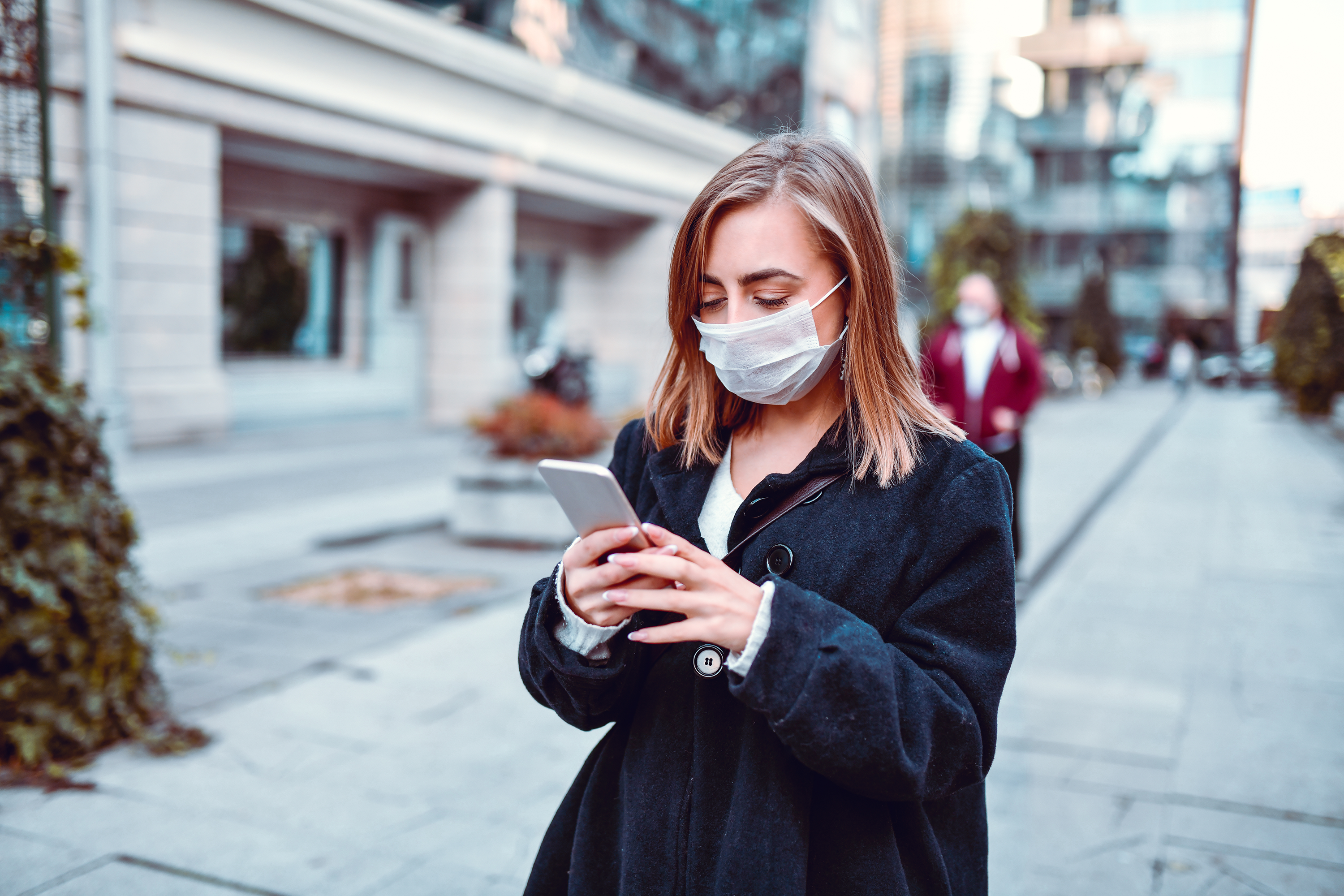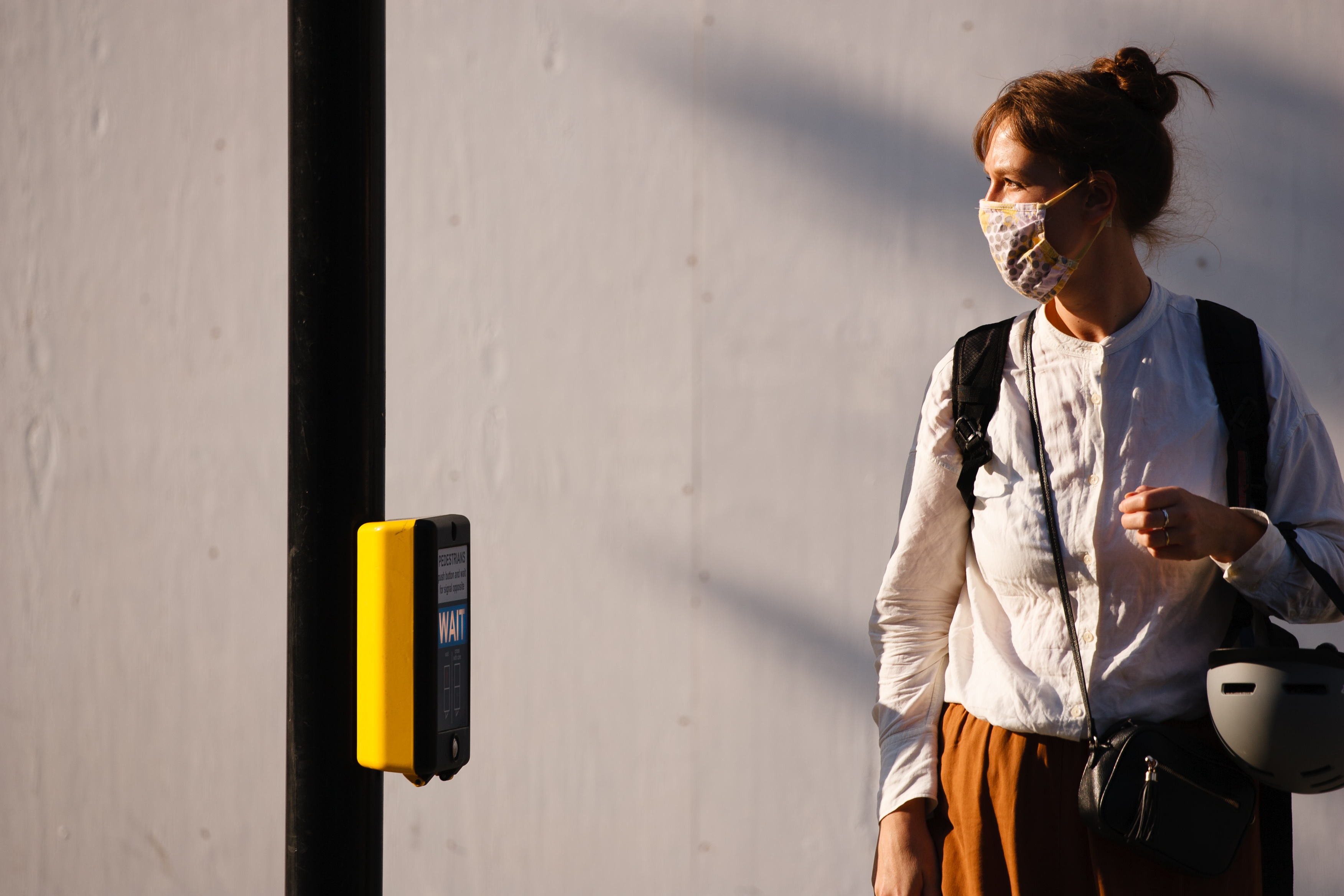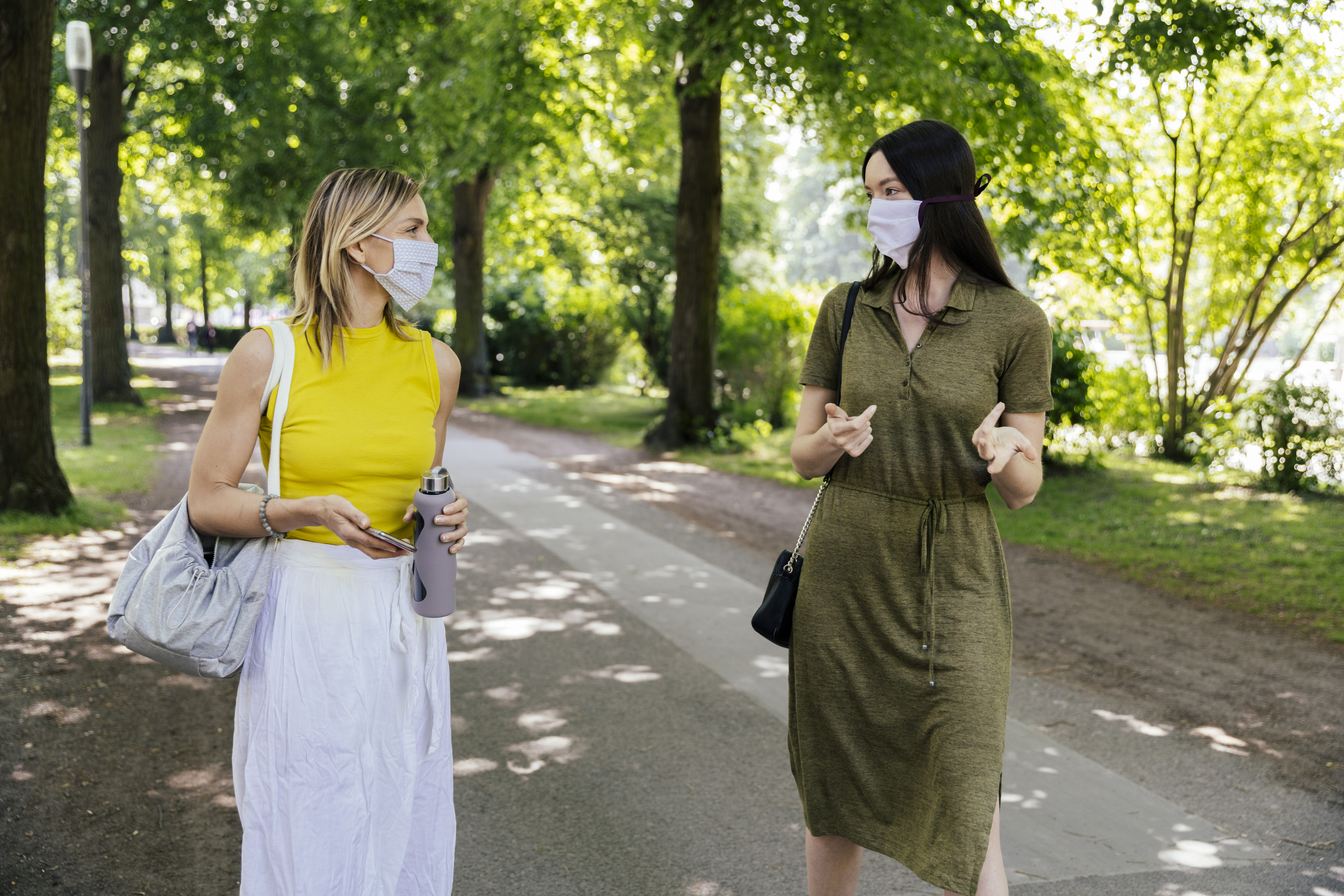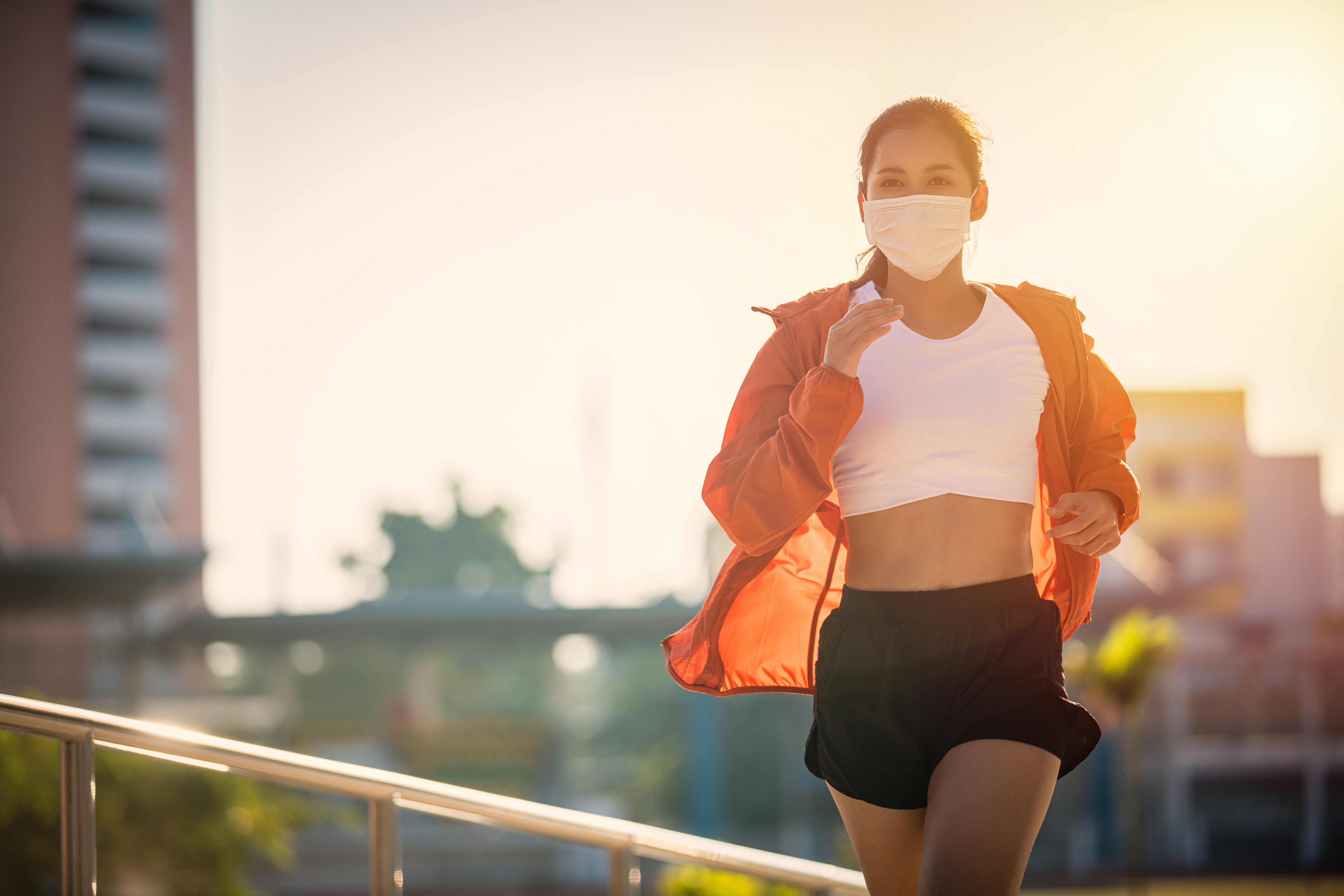Should you wear a mask outside to protect against Covid-19?


Should you wear a mask outside to protect against Covid-19? This is what the experts say...
With 1 in 50 people now testing positive for coronavirus, a number that increases to 1 in 20 in some parts of London, there have been calls for stricter lockdown rules to reduce the spread of Covid-19.
Encouraging people to wear a mask outside, instead of just face masks on public transport and in shops, has been one of the potential measures discussed. Top medical experts from the UK government's Scientific Advisory Group for Emergencies (SAGE) have been backing the idea for some time, with face masks being a proven method of reducing the risk of spreading coronavirus to others.
So should you wear a mask outside as a protective measure against coronavirus? This is what the experts have to say...
Should you wear a mask outside to protect against Covid-19?
Back in October 2020, various doctors and the British Medical Association (BMA) called for masks to be made compulsory in all outdoor settings where the standard two-metre social distancing isn't possible.
One of the experts backing the call was Professor Calum Semple, an expert in outbreak medicine at the University of Liverpool. He's also a member of the government's SAGE committee. He said, "At the start of the outbreak, we didn't really understand much about this virus and nobody else did, but we now appreciate the importance of face coverings and masks in an indoor environment, particularly where ventilation cannot be guaranteed.
"In reality, if you're outside walking your dog on your own and you're many metres away from other people then wearing a mask is making no difference." He said, "But if you're in a city centre shopping precinct, or you're queueing outside the shops then yes, you should be wearing a mask."
Parenting advice, hot topics, best buys and family finance tips delivered straight to your inbox.

This is because the virus spreads from an infected person's mouth or nose in small liquid particles when they cough, sneeze, speak or breathe. According to the World Health Organisation (WHO): "Other people can catch COVID-19 when the virus gets into their mouth, nose or eyes, which is more likely to happen when people are in direct or close contact (less than 1 metre apart) with an infected person.
"Current evidence suggests that the main way the virus spreads is by respiratory droplets among people who are in close contact with each other."
The longer you spend in proximity to others and the closer you get to them, the more chance you have of coming into range of someone with the virus and them passing it onto you. This applies both inside and outside in spaces such as a queue or a crowded footpath.
Studies conducted since the beginning of the pandemic, including this one by Oxford University, have proven that 'cloth face coverings are effective in protecting the wearer and those around them' but 'face masks need to be seen as part of 'policy packages' with other measures such as social distancing and hand hygiene.'
‘Next to hand washing and social distancing, face masks and coverings are one of the most of widely adopted non-pharmaceutical interventions for reducing the transmission of respiratory infections.’

There is little information around to what extent mandatory mask wearing would be effective outside. However, in crowded outdoor spaces where social distancing can't be maintained, it's proven that wearing a mask outside could make a difference and as such, it's been implemented into guidance around the world.
Scotland has in fact become the latest country to make mask wearing outdoors mandatory in some situations. The country joins the likes of Spain, Italy, some parts of France and states in the US to implement an outdoor mask-wearing policy. The Scottish governmental guidance says, "Whilst it is not compulsory to wear a face covering outdoors it is recommended in crowded situations where physical distancing is not always possible, such as at the school gate or at the entrance to a building. In such circumstances you are expected to wear a face covering.”
Should you wear a mask while running?

Another question that keeps coming up is whether runners, especially those in cities who weave in and out of people on the pavements, should wear a mask outside - and whether they're able to.
Dr James Thing is a consultant in musculoskeletal, sport and exercise medicine at Highgate Private Hospital. He says that wearing a face mask can have an impact on the temperature and humidity of the air we breathe, but "with normal day-to-day activities, wearing a mask should have little to no impact on oxygen levels."
"At higher intensity exercise levels, wearing certain masks can have an effect on breathing resistance, i.e. how hard we have to work to breathe." He says, "It is however safe to wear a face mask while exercising. Recent studies have demonstrated that heart rate, breathing rate, blood pressure and oxygen levels are not significantly affected by wearing a mask during modern to vigorous intensity exercise. Research shows that mask wearing has no effect on the time it takes to become exhausted or on maximum power output."
Eddie Fletcher, sport and exercise physiologist for Fletcher Sport Science Ltd, agrees. He says, "For the safety of others - if running or cycling in public areas - wearing a mask is advisable. Normal exhaled air travels around 1.5 m but much further when running/cycling so wearing a mask is recommended in public areas. Holding your breath as you pass people and for people being passed holding their breath when passed, is a good discipline. It’s also important to adhere to social distancing rules when passing others."

Anyone worried about not hitting their distance goals doesn't have to be concerned, as Eddie says, "Wearing a mask is not particularly restricting for low intensity exercise and shouldn't affect performance in any meaningful way."
"It’s important when using disposable masks to wear once only, and dispose of safely. Reusable masks wash after every use.
"Some people with breathing restrictions (asthma for instance) may have to reduce the intensity of exercise. There is no evidence that a mask will restrict breathing significantly, but if you are in doubt it’s always best practice to consult a doctor.
"I wouldn't recommend high intensity exercise in a mask but, if done, then a mask should really be worn in public areas."
Where do you have to wear a mask at the moment?
Currently, the only places where it is compulsory to wear a mask are on public transport, in shops, supermarkets and shopping centres. You do not have to wear a mask outside. When hospitality venues were open, customers also had to wear a mask walking around the venue and when they weren't sat at a table. There was also a time where children had to wear face masks in secondary schools in the UK.
However, as of Monday January 18, those wanting to shop in either Sainsbury's or Morrisons will have to wear a mask in store otherwise they'll be refused entry, while London's Borough Market has become the first outdoor space in the UK to tell people to wear a mask outside when shopping.
It comes as enormous pressure is being put on the NHS to treat patients with the new Covid-19 variant, proven to be up to 70% more transmissible than the original strain. In recognition of the struggle and warning from top practitioners that they're running out of beds in some hospitals, the UK's chief medical officers and the NHS England medical director recommended that the government should move the alert level from a 4 to a level 5.
Different from the lockdown tier system, this level of alert means that the NHS is close to being overwhelmed if something isn't done soon. In a joint statement, the medical officers and the director of NHS England said, "Many parts of the health systems in the 4 nations are already under immense pressure. There are currently very high rates of community transmission, with substantial numbers of COVID patients in hospitals and in intensive care."

Grace Walsh is a health and wellbeing writer, working across the subjects of family, relationships, and LGBT topics, as well as sleep and mental health. A digital journalist with over six years experience as a writer and editor for UK publications, Grace is currently Health Editor for womanandhome.com and has also worked with Cosmopolitan, Red, The i Paper, GoodtoKnow, and more. After graduating from the University of Warwick, she started her career writing about the complexities of sex and relationships, before combining personal hobbies with professional and writing about fitness.